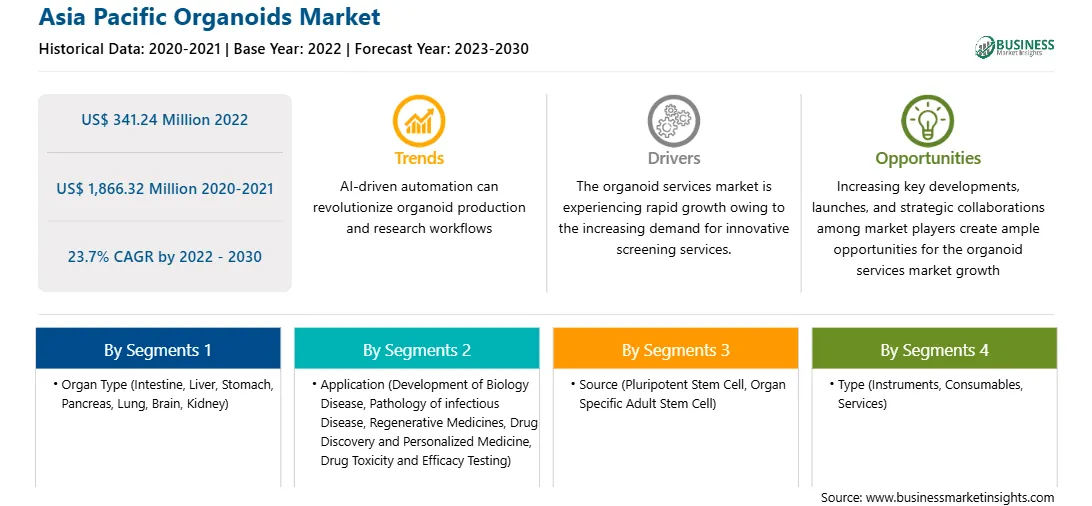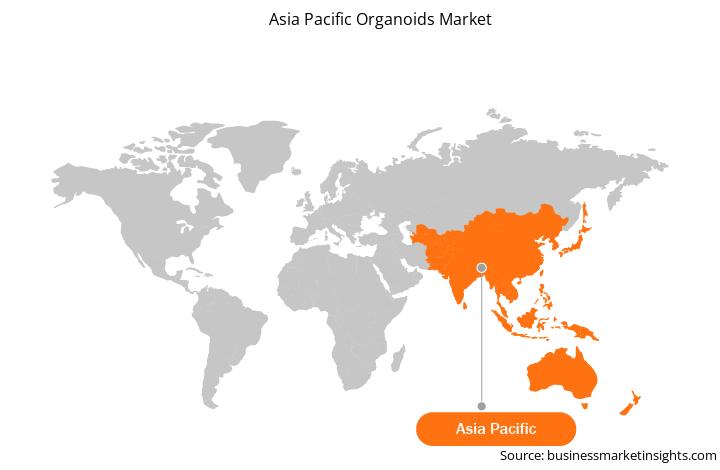The increasing demand for new and advanced drugs is driving the overall pace of drug discovery and research. According to ClinicalTrials.gov, the total number of clinical trial studies in 2020 was estimated to be 356,282. A recent survey by the Hubrecht Institute states that organoids can potentially make expensive drugs more cost-effective by identifying patients who are not likely to benefit from the drug. An increasing number of clinical trials worldwide is expected to drive the demand for advanced medical technologies, including organoid models.
Further, organoids in drug discovery are not limited to just cancer, they are also used in other diseases, such as cystic fibrosis, polycystic kidney disease, microcephaly, and infectious diseases of the gut and airway. For instance, organoids can summarize the properties of an organ, such as organ structure and function. Also, organoids can restore a tissue or organ's original genetic and epigenetic state, making them suitable for gene editing. Various studies have shown positive results of combining CRISPR-Cas9 technology with organoids, which has expanded opportunities for breakthroughs in cystic fibrosis. According to a study ‘CRISPR-Based Adenine Editors Correct Nonsense Mutations in a Cystic Fibrosis Organoid Biobank,’ published in 2020, a biobank of cystic fibrosis intestinal organoids represented 664 patients, and ~20% of them were theoretically able to efficiently repair nonsense mutations in the cystic fibrosis transmembrane conductor receptor through adenine base editors. Despite a few achievements of gene-edited organoids in some animal models, their efficiency is significantly low, and the success rate is not high. Therefore, it is crucial to research and develop a process for gene-edited organoids' safety, long-term stability, and functionality.
Moreover, the COVID-19 pandemic triggered the need to develop human lung organoid models. For instance, MilliporeSigma developed a 3dGRO Human Lung Organoid Culture System that allows researchers to control, access, and reproduce organ tissue for culturing an organoid model of human lung epithelium that can aid in obtaining positive and successful results during their research. Thus, such innovations are expected to offer more significant growth opportunities for the market growth.
The Asia Pacific organoids market is segmented into Australia, China, India, Japan, South Korea, and the Rest of Asia Pacific. The market in the region is likely to continue to grow at the fastest rate during the forecast period owing to factors such as increasing incidences of cancer, growing demand for gene mutation and cancer research, government efforts to raise awareness related to human organoids, supportive regulations for the development and commercialization of advanced human organoids products, and increased funding for organoids research.
Strategic insights for the Asia Pacific Organoids provides data-driven analysis of the industry landscape, including current trends, key players, and regional nuances. These insights offer actionable recommendations, enabling readers to differentiate themselves from competitors by identifying untapped segments or developing unique value propositions. Leveraging data analytics, these insights help industry players anticipate the market shifts, whether investors, manufacturers, or other stakeholders. A future-oriented perspective is essential, helping stakeholders anticipate market shifts and position themselves for long-term success in this dynamic region. Ultimately, effective strategic insights empower readers to make informed decisions that drive profitability and achieve their business objectives within the market. The geographic scope of the Asia Pacific Organoids refers to the specific areas in which a business operates and competes. Understanding local distinctions, such as diverse consumer preferences (e.g., demand for specific plug types or battery backup durations), varying economic conditions, and regulatory environments, is crucial for tailoring strategies to specific markets. Businesses can expand their reach by identifying underserved areas or adapting their offerings to meet local demands. A clear market focus allows for more effective resource allocation, targeted marketing campaigns, and better positioning against local competitors, ultimately driving growth in those targeted areas.Asia Pacific Organoids Strategic Insights

Asia Pacific Organoids Report Scope
Report Attribute
Details
Market size in 2022
US$ 341.24 Million
Market Size by 2030
US$ 1,866.32 Million
Global CAGR (2022 - 2030)
23.7%
Historical Data
2020-2021
Forecast period
2023-2030
Segments Covered
By Organ Type
By Application
By Source
By Type
Regions and Countries Covered
Asia-Pacific
Market leaders and key company profiles
Asia Pacific Organoids Regional Insights

The Asia Pacific organoids market is segmented into organ type, type application, source, and country.
Based on organ type, the Asia Pacific organoids market is segmented into intestine, liver, stomach, pancreas, lung, brain, kidney, and others. The intestine segment held the largest share of the Asia Pacific organoids market in 2022.
Based on type, the Asia Pacific organoids market is segmented into instruments, consumables, and services. The consumables segment held the largest share of the Asia Pacific organoids market in 2022.
Based on application, the Asia Pacific organoids market is segmented into developmental biology disease, pathology of infectious disease, regenerative medicine, drug toxicity and efficacy testing, drug discovery and personalized medicine, and others. The developmental biology disease segment held largest share of the Asia Pacific organoids market in 2022.
Based on source, the Asia Pacific organoids market is bifurcated into pluripotent stem cells and organ-specific adult stem cell. The pluripotent stem cells segment held a larger share of the Asia Pacific organoids market in 2022.
Based on country, the Asia Pacific organoids market is segmented into the Japan, China, Australia, India, South Korea, and the Rest of Asia Pacific. Japan dominated the Asia Pacific organoids market in 2022.
Cellesce, Corning Inc, InSphero, Merck KGaA, STEMCELL Technologies Inc, and Thermo Fisher Scientific Inc are some of the leading companies operating in the Asia Pacific organoids market.
The Asia Pacific Organoids Market is valued at US$ 341.24 Million in 2022, it is projected to reach US$ 1,866.32 Million by 2030.
As per our report Asia Pacific Organoids Market, the market size is valued at US$ 341.24 Million in 2022, projecting it to reach US$ 1,866.32 Million by 2030. This translates to a CAGR of approximately 23.7% during the forecast period.
The Asia Pacific Organoids Market report typically cover these key segments-
The historic period, base year, and forecast period can vary slightly depending on the specific market research report. However, for the Asia Pacific Organoids Market report:
The Asia Pacific Organoids Market is populated by several key players, each contributing to its growth and innovation. Some of the major players include:
The Asia Pacific Organoids Market report is valuable for diverse stakeholders, including:
Essentially, anyone involved in or considering involvement in the Asia Pacific Organoids Market value chain can benefit from the information contained in a comprehensive market report.